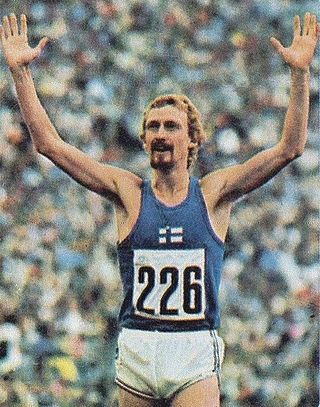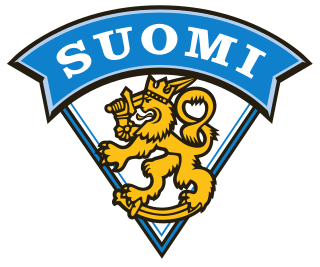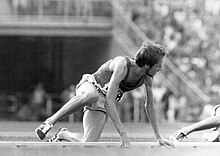
Pekka Antero Vasala is a retired Finnish middle-distance athlete who won an Olympic gold medal in the 1972 Summer Olympics in Munich.

Ilves is a Finnish professional ice hockey team based in Tampere. They play in the Liiga at the Tampere Deck Arena.

The Finnish men's national ice hockey team, nicknamed Leijonat / Lejonen, is governed by the Finnish Ice Hockey Association. Finland is one of the most successful national ice hockey teams in the world and a member of the so-called "Big Six", the unofficial group of the six strongest men's ice hockey nations, along with Canada, the United States, Czechia, Russia, and Sweden.

Norway was represented at the 1972 Summer Olympics in Munich by the Norwegian Olympic Committee and Confederation of Sports. 112 competitors, 101 men and 11 women, took part in 70 events in 15 sports.

Finland competed at the 1976 Summer Olympics in Montreal, Quebec, Canada. 83 competitors, 77 men and 6 women, took part in 63 events in 14 sports.

Finland competed at the 1980 Summer Olympics in Moscow, USSR. 105 competitors, 99 men and 6 women, took part in 71 events in 16 sports.

Australia competed at the 1980 Summer Olympics in Moscow, USSR. In partial support of the American-led boycott of the 1980 Summer Olympics Australia competed under the Olympic Flag. 120 competitors, 92 men and 28 women, took part in 92 events in 17 sports.

Finland competed at the 1984 Summer Olympics in Los Angeles, California, United States. 86 competitors, 73 men and 13 women, took part in 76 events in 15 sports.

Mexico competed at the 1984 Summer Olympics in Los Angeles, United States. 99 competitors, 77 men and 22 women, took part in 87 events in 18 sports.

Finland competed at the 2000 Summer Olympics in Sydney, Australia.

The Finnish Academy of Science and Letters is a Finnish learned society. It was founded in 1908 and is thus the second oldest academy in Finland. The oldest is the Finnish Society of Sciences and Letters, which was founded in 1838.

The Finland men's national basketball team represents Finland in international basketball competition. The national team is governed by Basketball Finland.

Finland competed at the 1968 Summer Olympics in Mexico City, Mexico. 66 competitors, 60 men and 6 women, took part in 61 events in 13 sports.

Finland competed at the 1964 Summer Olympics in Tokyo, Japan. 89 competitors, 84 men and 5 women, took part in 64 events in 13 sports.

Finland was the host nation for the 1952 Summer Olympics in Helsinki. 258 competitors, 228 men and 30 women, took part in 139 events in 18 sports. The nation won 22 medals.

Juha Väätäinen is a Finnish former athlete. He is the winner of the 5,000-meter and 10,000-meter gold medals at the 1971 European Championships, held in Helsinki. He was the eldest of the successful Finnish runners, the others being Lasse Virén, Pekka Vasala, Tapio Kantanen, Martti Vainio, and Kaarlo Maaninka, who came into the limelight in the 1970s. He served as a Member of the Finnish Parliament for Helsinki, representing the Finns Party between 2011 and 2015.

The men's 1,500m metres was an event at the 1972 Summer Olympics in Munich, West Germany. The final was held on Sunday 10 September 1972 and was contested by 10 athletes. The semi-finals were held on Saturday 9 September 1972 and were contested by 27 athletes. The heats were held on Friday 8 September 1972 and 71 athletes entered, with 66 runners from 46 nations competing. The maximum number of athletes per nation had been set at 3 since the 1930 Olympic Congress. The event was won by Pekka Vasala of Finland, the nation's first championship in the 1500 metres since back-to-back wins in 1924 and 1928. Kipchoge Keino of Kenya came half a second short of becoming the first man to successfully defend Olympic gold in the event; instead, his silver made him just the second man to win two medals of any color in the 1500 metres.













